Honoring the Blessed Virgin Mary during the Month of the Rosary
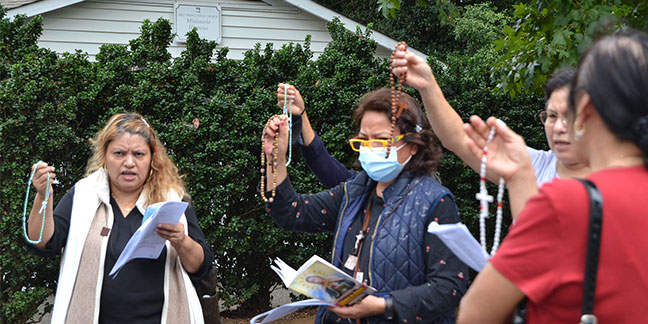 Holy Cross parishioners took part in a “Rosary Rally” Oct. 16 in Kernersville.
Holy Cross parishioners took part in a “Rosary Rally” Oct. 16 in Kernersville.
— Paul Doizé, Catholic News Herald
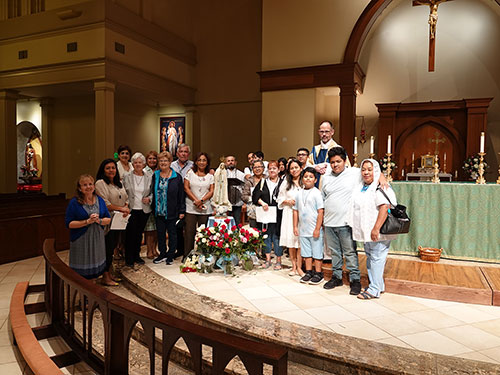 A bilingual Mass and Consecration to Jesus through Mary was offered Oct. 13 at St. Mark Church in Huntersville.
A bilingual Mass and Consecration to Jesus through Mary was offered Oct. 13 at St. Mark Church in Huntersville.
Father John Putnam, pastor, led 165 people through the consecration prayer in both English and Spanish.
All who attended also received a blessed Miraculous Medal and had the opportunity to enroll in the Brown Scapular.
The parish-wide consecration got under way in August, with the 33-day preparation starting Sept. 4.
The effort was led for a third year by parishioner Caroly Cashman. “All of us are called to serve one way or another,” Cashman said.
“As Catholics, we are called to evangelize, to help save souls. For many of us, this is not an easy task.
It’s much easier to help others grow closer to Mary who then takes charge and touches the hearts of those who turn their lives over to her love and care.
Mary will walk with us throughout our lives.
When we reach out to her for help, she will always guide our steps on the path that leads to Jesus.”
— Photo provided by Amy Burger
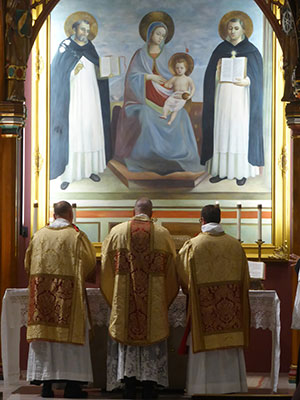 A special Mass commemorating the feast of Our Lady of the Rosary was offered at St. Thomas Aquinas Church in Charlotte Oct. 7.
A special Mass commemorating the feast of Our Lady of the Rosary was offered at St. Thomas Aquinas Church in Charlotte Oct. 7.
The Mass was celebrated by St. Joseph College Seminary rector Father Matthew Kauth. He was assisted by a visiting priest, Father Michael Hendershott of the Diocese of Knoxville, and Father Matthew Buettner, spiritual director of St. Joseph College Seminary.
Gregorian chant was provided by the St. Thomas Aquinas schola, led by the parish’s music director Tom Savoy.
The day marked the 450th anniversary of the Battle of Lepanto, where on Oct. 7, 1571, the Holy League fleet, supported by St. Pius V and led by Don Juan of Austria, achieved a miraculous naval victory over the Turks after the pope called on Catholics across Europe to pray the rosary.
Soon after the victory, the pope established the feast day to commemorate Our Lady’s assistance and is now known as the feast of Our Lady of the Rosary.
— Mike FitzGerald, Catholic News Herald
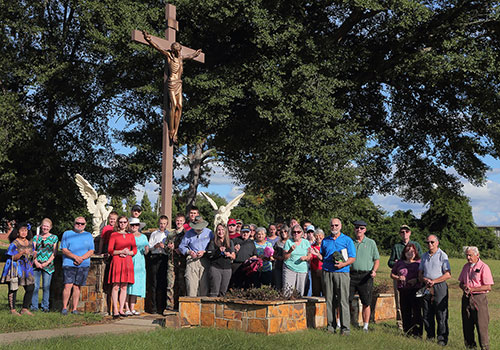 Parishioners of Immaculate Conception Church in Forest City participated in the sixth annual Coast to Coast National Rosary Rally in support of the sanctity of life, held Oct. 10.
Parishioners of Immaculate Conception Church in Forest City participated in the sixth annual Coast to Coast National Rosary Rally in support of the sanctity of life, held Oct. 10.
They joined Knights of Columbus and Catholic congregations across the nation by praying the rosary at the Come Follow Me Crucifix, in front of the church.
— Giuliana Polinari Riley, Catholic News Herald
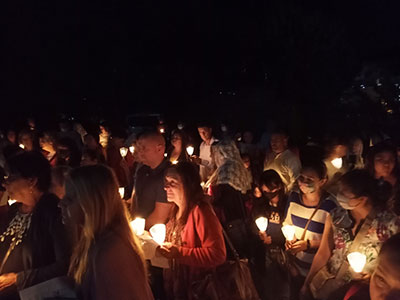 Approximately 200 period gathered Oct. 13 for Mass, the International Rosary, a Marian profession and fellowship at St. John the Evangelist Church in Waynesville.
Approximately 200 period gathered Oct. 13 for Mass, the International Rosary, a Marian profession and fellowship at St. John the Evangelist Church in Waynesville.
The Marian procession was in candlelight.
This was the final international rosary for 2021 and celebrated the Miracle of the Sun in Fatima.
— Photo provided by Nicki Conroy
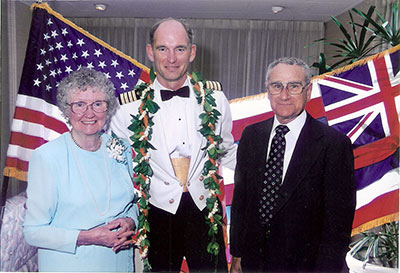 WINSTON-SALEM — The Catholic faith and education were both important to the late Joseph Baldi.
WINSTON-SALEM — The Catholic faith and education were both important to the late Joseph Baldi.
He passed away Feb. 7 at the age of 103, leaving several legacy gifts benefiting the Church in western North Carolina, including adding to the family’s endowment fund to benefit St. Leo School and choosing the income from his established gift annuities to benefit the Catholic Charities Endowment Fund and the Diocese of Charlotte’s Seminarian Education Endowment Fund.
A son of Italian immigrants, Baldi and his late wife Margaret raised their two children in the faith and emphasized the limitless possibilities of education. The couple put their beliefs into action throughout their years at St. Leo Church, supporting the parish and the school with their charitable giving.
In 2015, Baldi created the Joseph and Margaret Baldi Endowment Fund with an initial gift of $40,000 to provide tuition assistance for children of St. Leo Parish families to attend the parish’s school.
When asked in 2016 why he wanted to set up a named endowment, Baldi said, “I had heard that some of the children who wanted to attend St. Leo School could not afford the tuition, so I created the Joseph and Margaret Baldi Endowment Fund to provide tuition assistance. We have four grandchildren and 11 great-grandchildren, and I know my wife would have loved the idea of a gift that helps children get a good Catholic education.”
Upon his passing, Baldi’s two charitable gift annuities amounted to more than $134,000. More than $78,000 was distributed to the Joseph and Margaret Baldi Endowment Fund for St. Leo School. The Catholic Charities Endowment Fund and the Seminarian Endowment Fund received more than $27,000 each.
“The Church was always very important in their lives,” said their daughter, Patricia Baldi. “My dad had enough money, which he earned through hard work, and (he) wanted to pay some of that back, to give other children the opportunity to get an education.”
“My mother felt the same way about education,” she added.
Her father’s memorial service, postponed due to the COVID-19 pandemic, was held Sept. 17 at the Western Carolina State Veteran’s Cemetery in Black Mountain.
“I fondly remember Mr. Baldi attending the Catholic Heritage Society Mass and dinner that Bishop Jugis hosts each year,” said Gina Rhodes, diocesan director of planned giving. “Mr. Baldi spoke of the blessings that he and Margaret had received during their lives and wanted to be sure that others, especially children, would be given opportunities. We are so thankful that he chose to remember the Church by establishing a named endowment during his life and leaving gifts to three endowments through his estate plan.”
— SueAnn Howell, Senior reporter
Create an endowment
Interested in setting up an endowment at your parish or Catholic school? Establish an endowment in the Diocese of Charlotte Foundation by leaving a bequest in a will, a beneficiary designation from a retirement plan, a gift of real estate, a gift of life insurance, cash or securities sufficient to set up an endowment, or a life income arrangement such as a trust or annuity. For details, contact Gina Rhodes at 704-370-3364 or This email address is being protected from spambots. You need JavaScript enabled to view it..

